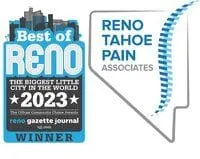Your back or neck pain could be caused by spinal canal stenosis, a condition that occurs due to changes in your spine. Fortunately, your Reno, NV, pain management physician, Dr. Ali Nairizi of Reno Tahoe Pain Associates, offers treatments that ease the pain of spinal stenosis.
What happens if you have spinal canal stenosis?
Spinal canal stenosis occurs when the spaces inside your spine narrow and press against your nerves or spinal cord. Depending on where the narrowing occurs, you may feel pain in your back or neck, which can extend into your arms, legs, feet buttocks, or groin.
In addition to pain, you might also experience numbness, tingling, weakness, or heaviness in your arms or legs. If lower back symptoms are severe, spinal canal stenosis could even cause bladder or bowel incontinence.
What causes spinal canal stenosis?
Osteoarthritis, a type of arthritis caused by age-related wear and tear, is a common cause of spinal canal stenosis. Bone spurs that form as a result of arthritis can irritate or compress nerves.
Herniated discs, another problem that's more common as you get older, can also cause spinal canal stenosis. Rubbery discs cushion the spaces between the vertebrae in your spinal column and absorb shock. A herniated disc occurs when the soft inner core of the disc protrudes through the outer covering and presses on nerves.
Other causes of spinal canal stenosis can include tumors, cysts, thickened ligaments, spinal injuries, birth defects, and sciatica. Some people are born with narrow spinal canals and may be more likely to develop stenosis as they get older. Paget's disease, a disease that causes bone overgrowth, may also be to blame.
How do pain management physicians treat spinal canal stenosis?
During your visit to the Reno pain management office, your physician will review your symptoms and medical history and recommend a few tests to determine the cause of your symptoms. If you're diagnosed with spinal canal stenosis, you may benefit from one or more of these treatments:
- Heat or Ice: Both heat and ice may help reduce your pain and soothe aching joints and muscles.
- Physical Therapy: Physical therapy can reduce pressure on your nerves, improve the flexibility of your spine, and strengthen the muscles that support your spine.
- Pain Medications: Over-the-counter medications can help ease spinal stenosis pain, particularly nonsteroidal anti-inflammatories (NSAIDs). Ibuprofen, naproxen sodium, and other NSAIDs reduce both pain and inflammation. If these medications aren't helpful, stronger prescription medications may be prescribed.
- Corticosteroid Injections: Corticosteroid injections decrease irritation that can cause pain and also ease inflammation.
- Surgery: If spinal canal stenosis pain doesn't improve after trying other therapies, we can provide Vertiflex Superion implant and MILD procedure ( minimally invasive lumbar decompression). This also helps with cases of lumbar canal stenosis.
Are you struggling with spinal canal stenosis pain? Call your pain management physician in Reno, NV, Dr. Ali Nairizi of Reno Tahoe Pain Associates, at (775) 384-1127 to schedule your appointment.
